
Updated on: December 26, 2024
Short on time? Here’s the best iOS antivirus for 2025:
- 🥇 Norton : Offers excellent web security protections, Wi-Fi network scanning, dark web monitoring, a VPN, scam SMS message filtering, and more. It also comes with a 60-day money-back guarantee.
Apple doesn’t allow iOS security apps to perform “virus scans,” so there aren’t any iOS apps that offer traditional malware protection. iOS is designed to be very secure, with each app executed in its own “sandbox.” This means even if you were to download a malicious app, it wouldn’t be able to do major damage to your system.
But this doesn’t mean iOS devices are immune to threats. iOS devices are still vulnerable to network attacks, phishing links, apps with unauthorized access to data, fake websites, adware, phone theft, and more. In fact, 2025 has seen an escalation in iOS malware attacks — with the number of data breaches rising by 18%.
I’ve tested dozens of internet security apps to find the ones that can protect your device. I’ve identified 5 excellent ones that add to Apple’s built-in protection. Read on to find out more.
Quick Summary of the Best iOS Antivirus Apps for 2025
🥇1. Norton Mobile Security for iOS — Best iOS Security App in 2025
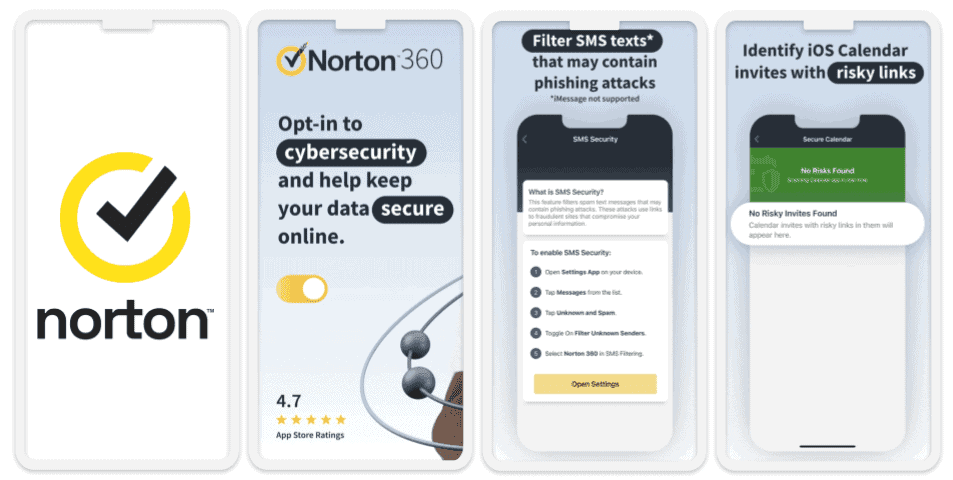
Norton Mobile Security for iOS is an intuitive security app for iOS devices that has all of the essentials for keeping your device safe online, including:
- Web protection — Detects malicious and phishing sites in browsers, apps, text messages, and emails.
- Dark web monitoring — Continuously scans the dark web for leaked or stolen personal details, including breached online accounts.
- VPN (virtual private network) — Encrypts your browsing traffic and hides your IP address location.
- Scam SMS message filtering — Protects against malicious SMS text messages.
- Wi-Fi scanner — Alerts you when you connect to an unsecure Wi-Fi network.
- Device security — Notifies you when your operating system is out of date and needs to be updated.
- Secure Calendar — flags any risky links in your iOS calendar invites.
I really like Norton’s web protection — during my tests, it caught several newer phishing sites that Safari failed to detect. Norton’s Secure Calendar also offers protection against suspicious iOS calendar invites, which could contain phishing links or links to other malicious websites.
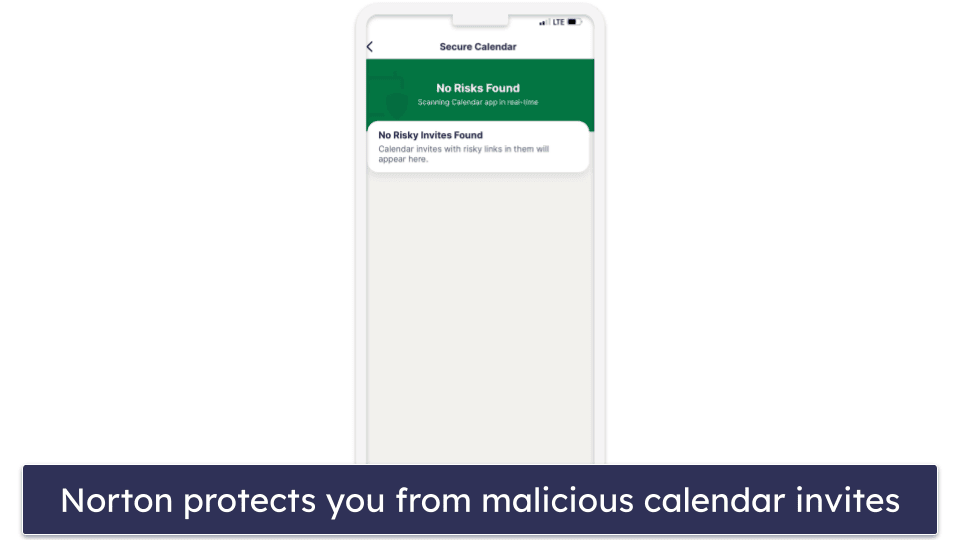
Norton’s dark web monitoring tools are some of the best on the market — Norton can continuously scan the dark web for your personal information, including your email address, bank account details, address, gamer tag, driver’s license, insurance documents, and even your mother’s maiden name (commonly used as a form of identity verification).
Norton’s VPN is an improvement over Apple’s iCloud Private Relay, which only works with Safari. In addition to hiding your identity online, it supports streaming and torrenting, and it turns on automatically when it detects you’re using a public Wi-Fi network. Also, its impact on your browsing speed is much lower than iCloud Private Relay.
I also like Norton’s device security feature. Often, Apple doesn’t issue alerts about updates, and you have to check manually or have automatic updates enabled. With Norton, I could clearly see if I had outstanding updates, and I’d be taken to the settings menu with just a couple of taps to apply them.
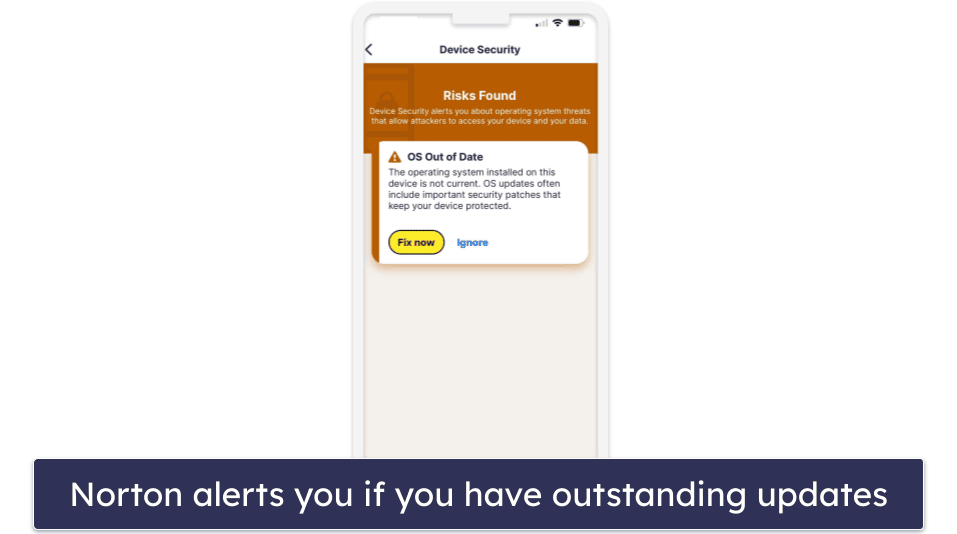
Norton Mobile Security for iOS is an intuitive install-and-forget iOS security app — it’s a good choice for users looking for a simple solution that they can use on one iOS device. It didn’t use much battery in my tests either — when I checked the battery usage statistics, it suggested it was using tons — but I didn’t actually notice any drain.
However, Norton 360 Deluxe ($49.99 / year*) is great for users with multiple devices (including PCs, Macs, and Androids) and users looking for additional protections. It adds coverage for up to 5 devices, excellent parental controls, and a password manager. And if you’re running low on your iCloud storage, this plan also adds 50 GB of secure cloud backup.
Bottom Line:
Norton offers an excellent security app for iOS users — it has web protection, dark web monitoring, scam SMS message filtering, a WI-Fi monitor, and more. Norton also offers excellent parental controls, a VPN, and a secure password manager for iOS users (but they come as separate apps). Norton Mobile Security only covers 1 iPhone or iPad, but all of these features are also included with Norton 360 Deluxe, which also adds coverage for up to 5 devices across all operating systems, the VPN, 50 GB of cloud storage, and more.
Read the full Norton review here >
🥈2. TotalAV Mobile Security — Intuitive + Easy-to-Use iPhone Antivirus
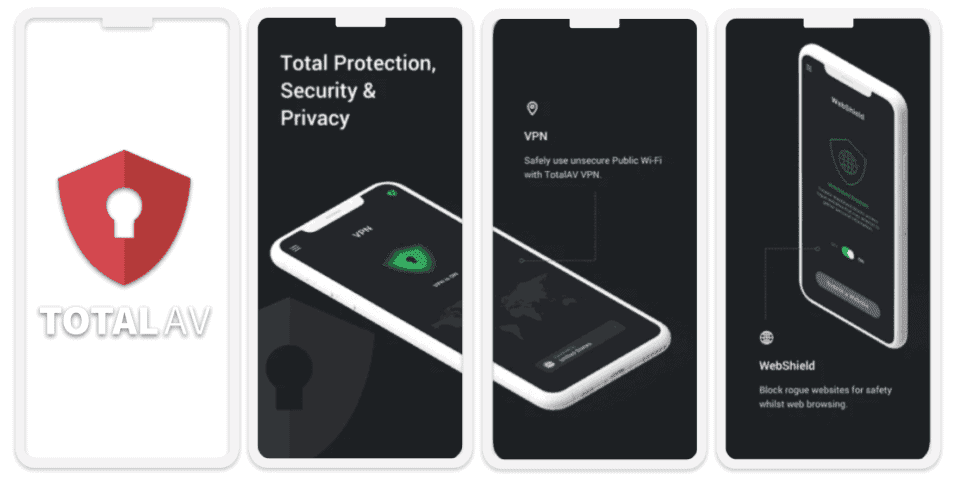
TotalAV Mobile Security is an intuitive security app for iOS users — it’s a particularly good choice for beginners or non-tech-savvy users looking for a simple, user-friendly iOS antivirus with all the essentials and a couple of really useful extras, including:
- Anti-phishing.
- VPN (with unlimited data).
- Photo & video clean-up.
- Data breach monitoring.
It’s unfortunate that TotalAV doesn’t provide cloud storage like Norton, but its other features make up for it. For one, TotalAV’s anti-phishing protection worked pretty well in my tests — it caught almost all phishing sites and correctly identified and blocked a couple of fake iCloud sites I tried visiting.
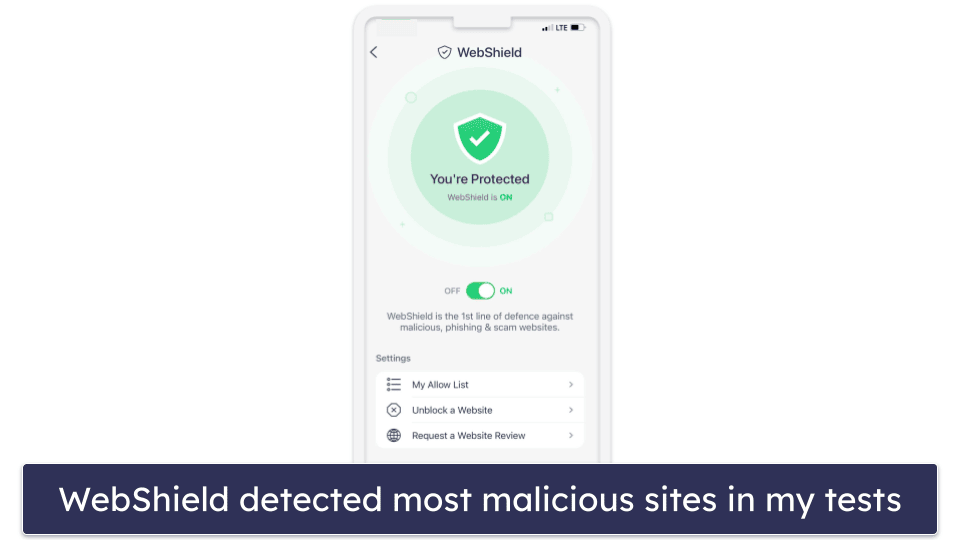
I was also impressed with TotalAV’s VPN, which provided me with encrypted access to servers around the globe. It allowed me to watch HD videos with no noticeable slowdown of my web connection. TotalAV’s VPN is the best antivirus-bundled VPN in 2025, and it’s comparable to some of the best standalone VPNs out there.
TotalAV’s Smart Scan feature works like a cybersecurity advisor for your iPhone, notifying you of pending iOS security updates, reminding you to set up your Touch or Face ID, and giving you security tips and suggestions. In a way, it helps you make the most out of Apple’s built-in protections.
I like TotalAV’s photo clean-up feature, too. It easily finds and deletes duplicate photos, helping to free up storage space and keep your gallery organized. Additionally, it scans for duplicate videos and contacts and lets you check each flagged file before removing it — which is great, as there’s no risk of accidentally deleting a file you don’t want to.
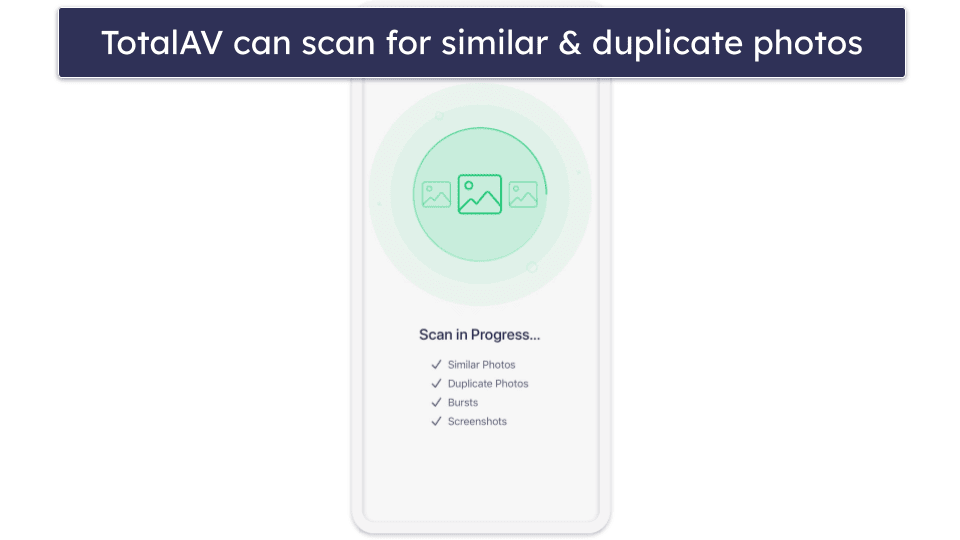
I should also mention that TotalAV didn’t drain my phone’s battery in my tests, and I liked that I could keep it running in the background without many notifications.
TotalAV Mobile Security is a simple security app with a good VPN — it’ll keep your device safe from hackers and web-based threats.You can also get TotalAV’s web protection with TotalAV Internet Security at $39.00 / year and cover up to 6 devices, including Macs, PCs, and Androids.
Bottom Line:
TotalAV is a good security app for beginner or non-technical iOS users — it offers a sleek and intuitive dashboard, an excellent VPN, data breach monitoring, and helpful extras like anti-phishing protection and photo storage cleanup. You can also get TotalAV Mobile Security bundled with PC, Mac, and Android security protection as part of TotalAV’s internet security suites that cover up to 8 devices and have a 30-day money-back guarantee.
Read the full TotalAV review here >
🥉3. McAfee Mobile Security – Great Phishing Protection for iPhones + iPads
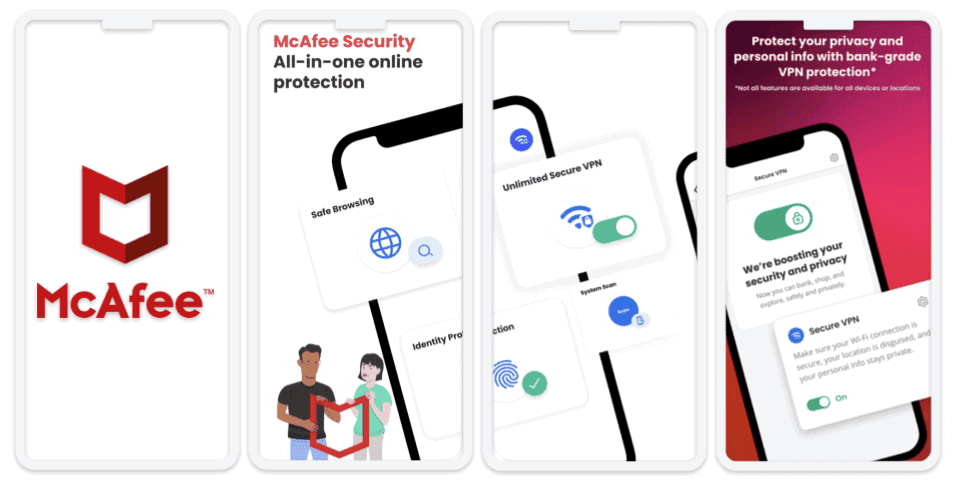
McAfee Mobile Security combines great web protections with a decent VPN. It also gives an overall security score and provides tips on how to improve your score. Initially, my security score was low, but once I’d activated all of McAfee’s features and ran various scans (including the data breach scan), I was able to significantly increase it.
During my tests, McAfee performed exceptionally well — it was able to find security issues with my device, like outdated iOS software and anti-phishing protections that were switched off, which put my iCloud at risk.
McAfee’s app didn’t drain my battery or slow down my iPhone (unlike some competitors), even though I kept the web protections permanently switched on. I also like how easy it was for me to use McAfee — the app is very intuitive, and all the features are easy to access.
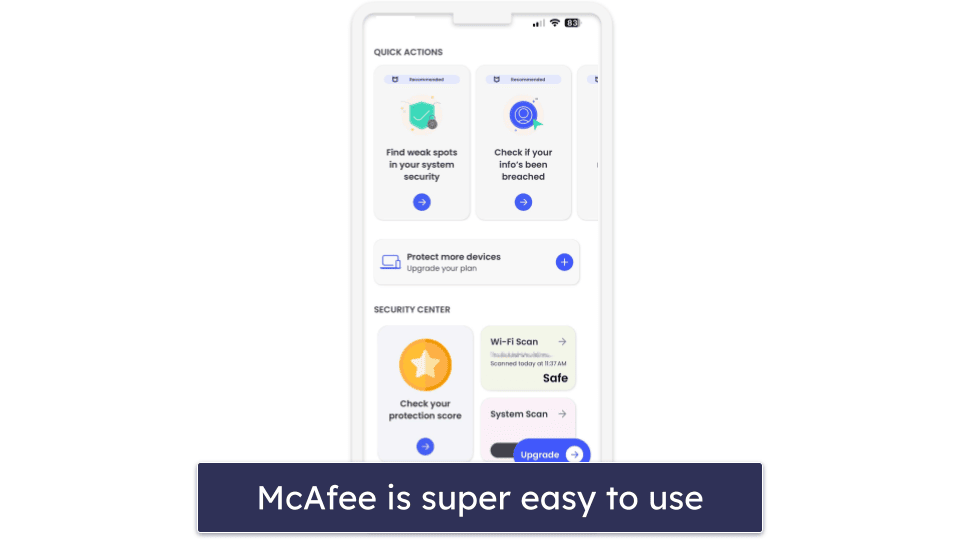
McAfee also comes with:
- Anti-phishing monitor.
- VPN (with unlimited data).
- Wi-Fi network scanner.
- Data breach alerts.
I think McAfee’s VPN is decent — it keeps you safe when you’re browsing the internet on unsecured Wi-Fi hotspots, it has a strict no-logs policy, and it works with most major streaming sites, like Netflix and Amazon Prime.
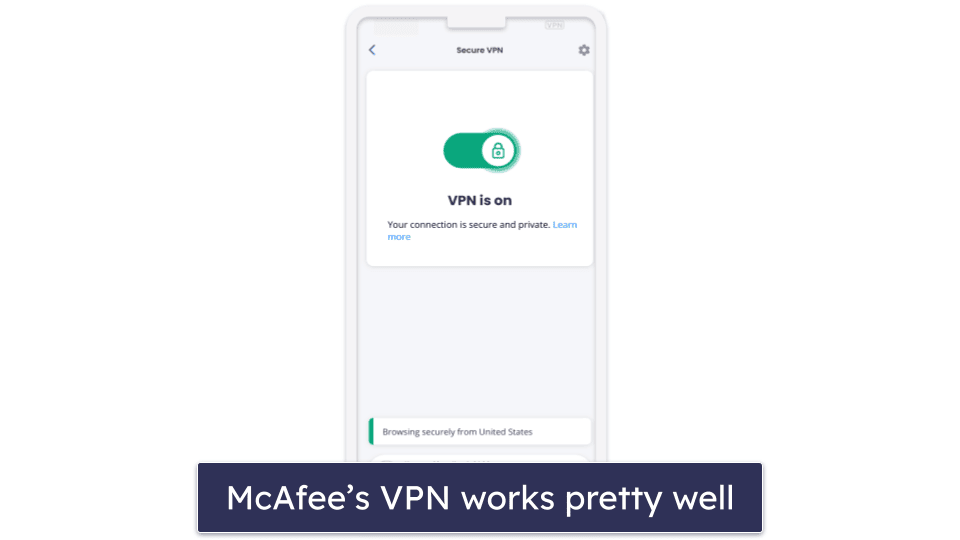
I like how most of McAfee’s tools complement rather than overlap Apple’s own security features. For example, it scans your SMS messages for signs of phishing scams, it helps you manage your personal info on social media platforms, and it assists you in removing the data collected by data brokers. It can also monitor up to 10 of your email addresses, credit cards, phone numbers, and your credit score.
McAfee Mobile Security is available for a single device for a yearly subscription, but if you want to protect multiple devices, you should consider McAfee Total Protection (starting at $39.99 / year) — it offers excellent security for either 5 or unlimited devices, including Windows, Android, and macOS devices.
Bottom Line:
McAfee provides a great app for protecting iPhones and iPads. Its web protections are really good — the anti-phishing protection is better than most competitors, and the VPN is secure, fast, and great for streaming. McAfee Mobile Security is a great choice for covering a single iPhone or iPad, while the Total Protection plans offer protection for 5 or unlimited devices for a very affordable 1-year or 2-year subscription.
Read the full McAfee review here >
4. Bitdefender Mobile Security – Excellent Scam Protection for iPhones

Bitdefender Mobile Security offers a good number of protective tools for iOS. It’s easy to use, and it didn’t slow down my iPhone in any of my tests. It includes:
- Vulnerability scanner.
- Web protection.
- Scam alert.
- VPN.
The vulnerability scanner identifies past data breaches and highlights websites where you need to change your password. It works pretty well — I could easily navigate onto a breached website, change my password, and mark the breach as resolved in Bitdefender. I also like how it checks whether you’re running the latest iOS version, as well as reviewing your Wi-Fi security, account privacy, and more — all without draining your battery.
The scam alert feature scanned over 600 events in my Apple Calendar in less than a minute, flagging those containing suspicious links. It also scanned my SMS/MMS inbox for dangerous messages and automatically moved any it found into my junk folder — it does the job well, though it was a little difficult to set up.
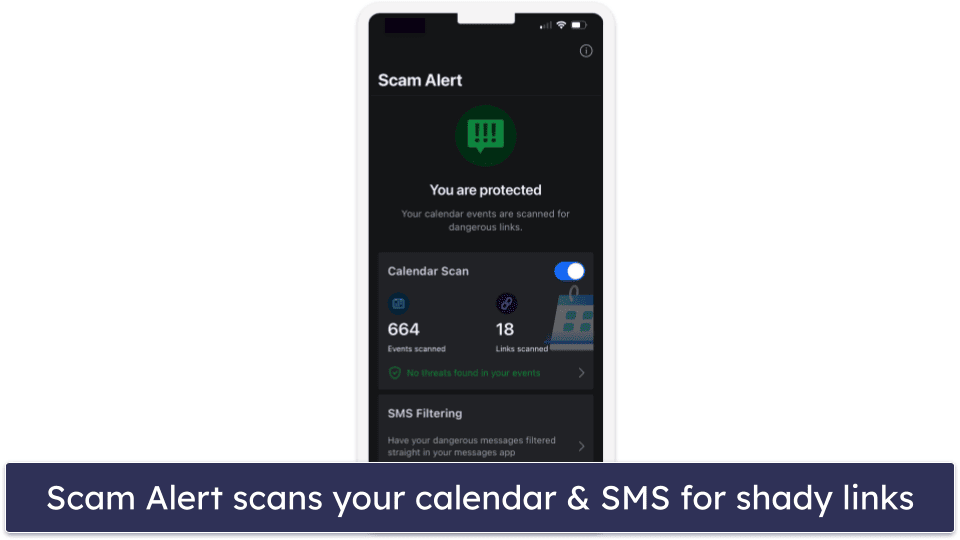
As for the VPN, you can access it directly from the antivirus app or download a separate app altogether. Unlike iCloud Private Relay, which only hides your IP address, it’s a fully fledged VPN with all the features you’d expect from such a service. I didn’t have any problems with it, but the 200 MB daily limit on most plans can be a bit restrictive when compared to Norton’s unlimited-data VPN.
Another interesting feature is Autopilot, which gives you personalized security recommendations based on your iPhone’s usage, letting you make the most of Bitdefender without having to learn its various functions.
Bitdefender Mobile Security, priced at $14.99 / year, covers 1 device and features everything listed above for iOS. For coverage across various platforms and access to the parental controls and password manager on iOS, Bitdefender Total Security costs $50.00 / year and protects up to 5 devices. The Premium Security option at $80.00 / year covers up to 10 devices and offers the unlimited-data VPN. All plans come with a 30-day money-back guarantee.
Bottom Line:
Bitdefender Mobile Security is a solid antivirus for iOS devices. The vulnerability scanner worked well in my tests and found multiple data breaches, and I liked how the scam alert feature scanned both my SMS messages and Apple calendar for anything suspicious. The VPN works well, too, even if it’s a little restrictive. Bitdefender Mobile Security starts at $14.99 / year and comes with a 30-day money-back guarantee.
Read the full Bitdefender review here >
5. Avira Free Mobile Security for iOS – Good Free Antivirus for iOS
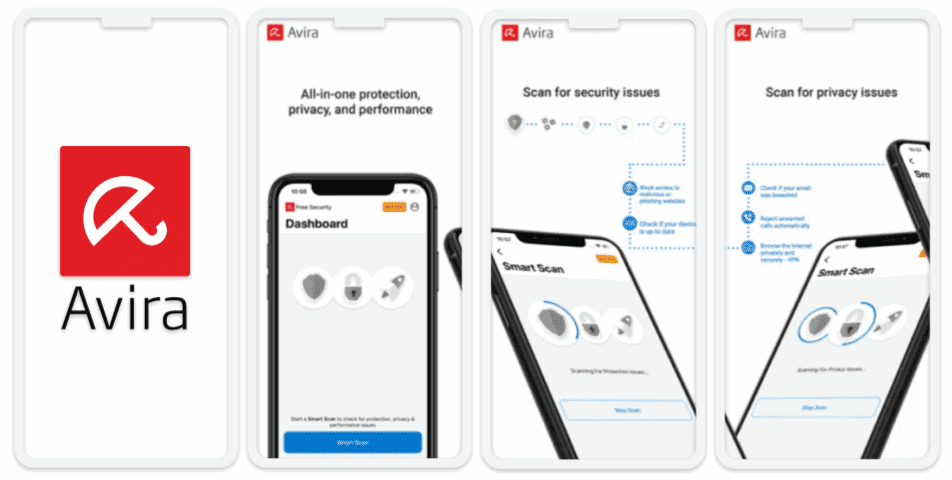
Avira Free Mobile Security for iOS comes with good free features, including excellent privacy protections that ensure your private data doesn’t end up compromised.
I was impressed with Avira’s unique Privacy Manager feature, which uses a specially designed downloadable “iOS Profile” to prevent Apple from saving your Siri conversations on its servers.
Avira also has additional iOS security protections like:
- VPN.
- Photo clean-up.
- Call blocker.
- Device optimizer.
- Breach monitor (Pro only).
- Anti-phishing (Pro only).
Avira also makes backing up and restoring your contacts super easy, letting you send all of your contacts to your email address, Dropbox account, or Google Drive. In comparison, Apple offers contact backup and recovery in iCloud, but you can’t send your contacts outside of iCloud or restore your contacts onto an Android device (although Windows is supported).
I also like Avira’s VPN — it’s one of the fastest VPNs I’ve used, enabling me to securely browse the web and stream video without noticeable speed drops. However, Avira’s free plan comes with a limited version of the VPN (100 MB per day). Also, I couldn’t get it to work with many popular streaming sites, which I was consistently able to do with TotalAV.
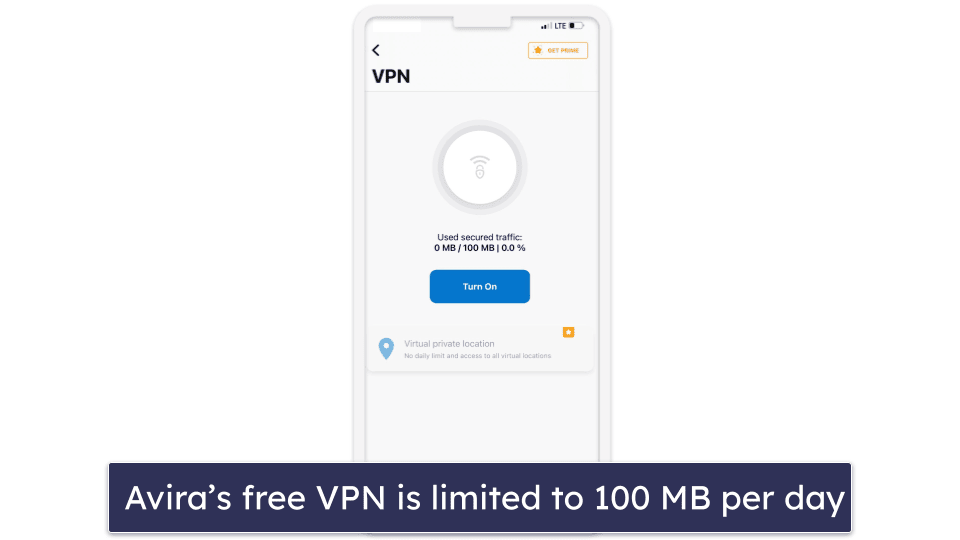
Avira Mobile Security Pro adds a VPN with unlimited browsing data as well as anti-phishing protections and data breach monitoring, all of which provide an extra layer of security online. You can get it as a standalone app, but it also comes bundled with Avira’s best-value internet security package, Avira Prime, which starts at $26.99 / year and covers up to 5 devices across all operating systems.
Bottom Line:
Avira has a really good free plan for iOS users — it includes 100 MB of daily VPN usage, spam call filtering, and device clean-up tools. However, Avira’s premium Mobile Security Pro is a better choice for most users, as it adds essential features like phishing protection, a VPN with unlimited data, and automatic data breach monitoring. This plan is also available bundled with Avira Prime, which covers up to 5 devices and has a risk-free 60-day money-back guarantee.
Read the full Avira review here >
Quick Comparison Table
Testing Methodology: Comparison & Ranking Criteria
In analyzing and ranking these antiviruses, I relied on our standard methodology. This involved extensive tests looking into every aspect of each product. Here’s an outline of what I did:
- I tested the web protections. I purposely visited dozens of sketchy websites, tapping on pop-ups and downloading suspicious files. As I went through each product, I kept diligent notes on how many threats were blocked and how many got through. Only the antiviruses that blocked most threats made it onto this list. Norton was particularly good in this area.
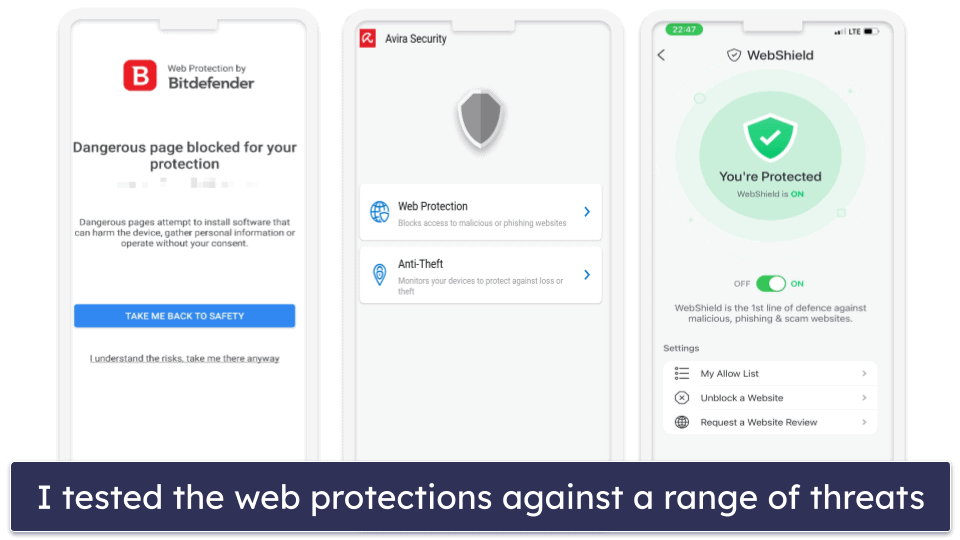
- I considered pricing. I looked up how much each antivirus costs, making note of international price variations. Then I compared the price with other similar antiviruses to see whether it was reasonable. Naturally, I also considered things like extra features that might make a higher price justifiable. I only included reasonably priced iOS antiviruses on this list.
- I analyzed each antivirus app for user-friendliness. I made sure that core features and extras were easy to set-up, tinker with, and use. I’m pleased to report that every tool on this list is easy to use, even for new users.
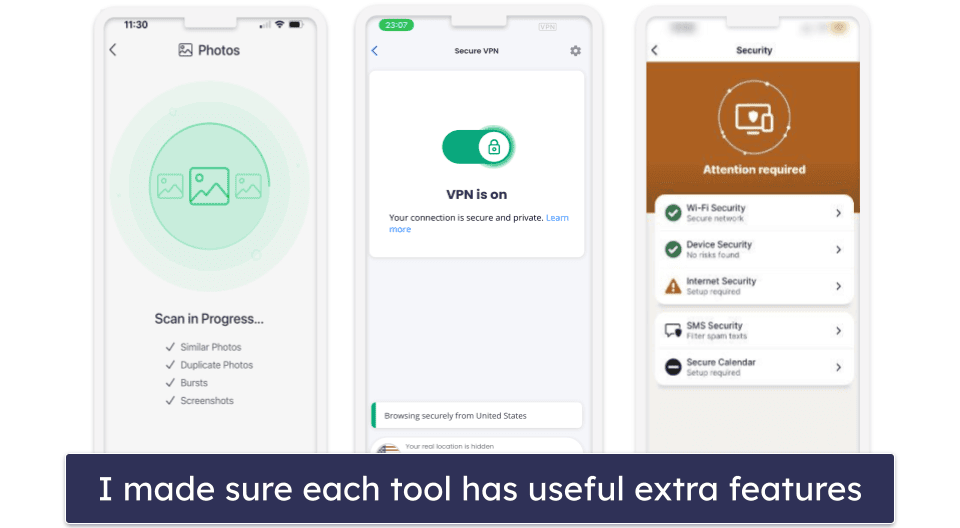
- I evaluated the extra features. The inclusion of features like VPNs, dark web monitoring, duplicate file finders, and Wi-Fi scanners earned outstanding antiviruses extra points. I particularly locked TotalAV’s photo cleanup tool, but every entry on this list has at least a couple of useful features that go beyond your basic security needs.
- I considered the customer support options. Each antivirus program listed provides multiple contact methods to ensure you can easily reach a support agent if you have questions about the application.
Do iOS Devices Need an Antivirus?
The short answer is yes. However, iPhones and iPads don’t get viruses like a computer or Android device does. The iOS operating system is built in a way that doesn’t allow traditional malware to spread throughout the system. iOS devices are vulnerable to a lot of other security threats though, including:
- Scam SMS and iMessage messages. These sometimes appear in your inbox and can trick you into revealing personal information or tapping on malicious links that cause further damage to your device.
- Email phishing attacks. Fraudulent emails that appear legitimate and attempt to steal sensitive information. Often, they’re from scammers posing as businesses you’ve dealt with in the past, so always look closely at who is sending the email you receive.
- Malicious iOS calendar invites. Unsolicited calendar invites containing links to harmful websites. Usually, these come from an account added to your iPhone’s settings that you need to delete.
- Phishing websites. Unlike email phishing attacks, these are entire sites designed to deceive you into providing personal data. They’re where you’ll likely end up after tapping on a link in a phishing email.
- Zero-day attacks. Exploits targeting unknown vulnerabilities in iOS. This is a huge reason why having outdated software on your iPhone is risky. Developers often release updates to patch zero-day threats.
- Device theft. Physical loss or theft of your device, which can lead to data breaches. Some antivirus programs provide anti-theft features to help you track down or lock a stolen device.
- And more…
Apple frequently releases updates to patch vulnerabilities in iOS devices. Despite these prompt updates, installing third-party antivirus protection is a wise move, as it can complement Apple’s built-in defenses.
How Apple Protects iOS Devices
While I believe Apple’s built-in security isn’t enough to fully protect your iPhone, Apple does take security seriously. Here are some key measures they use:
- Device Access Protection. Apple lets you unlock your iPhone with a passcode, fingerprint, or face ID. It also offers “Find My iPhone” to locate, lock, or erase your device if it’s lost. You can even track other people’s iPhones with their consent.
- Password Management. iCloud Keychain stores and manages your passwords, generates strong ones, and supports two-factor authentication. However, the best standalone iOS password managers offer better cross-platform compatibility and extras like dark web monitoring.
- Email and Web Protection. Mail Privacy Protection hides your IP from senders, and “Hide My Email” generates random addresses. However, Apple’s email protection does little to safeguard you against phishing scams delivered via email. That’s why it’s important to complement it with a reliable antivirus app like Norton, which can scan your email for malicious content.
- VPN. Apple offers iCloud Private Relay, which functions like a basic VPN, but standalone VPNs offer more features.
- Software Security. iOS apps must be approved by Apple; all software is code-signed to prevent malicious code. All apps on the App Store undergo a rigorous review process to ensure they meet Apple’s security and privacy guidelines.
- Operating System Protection. iOS uses strong encryption for data, including hardware-based encryption for data stored on the device and secure transmission protocols for data sent over the internet, and isolates apps through sandboxing, limiting damage from compromised apps.
- Security Updates. Apple regularly releases security updates for all devices at once. Additionally, iOS devices can automatically install security updates, ensuring that users are protected without requiring manual intervention. Some antiviruses, like TotalAV, can help you keep up with security updates, too, as they issue notifications about any pending iOS patches.
- User Privacy. iOS gives users control over app permissions and includes privacy labels on apps, helping users make informed choices.
How to Install an Antivirus on iOS
- Open the App Store on your iOS device. Simply find the icon on your home screen and tap it to open the App Store.

- Search for your desired antivirus app. In the search bar at the top of the App Store, type in the name of your chosen antivirus and tap Search. I recommend Norton, as it offers the best iOS features, but TotalAV and McAfee are good choices, too.

- Download the app. Tap the cloud icon to the right of the app to begin the download. Alternatively, tap the app to open its store page and tap Get. Depending on your device’s settings, you may have to confirm the download with your Face ID or a password.

- Open the app and follow the on-screen instructions. The instructions will differ depending on the antivirus you picked, but most will instruct you to create an account and choose a subscription plan. Some may even offer you a free trial period. Simply follow the on-screen instructions until you’re fully set up.

- Start using your antivirus. That’s it! You’re now ready to start using your antivirus. Explore some of the available features and enable any permissions needed for them to run correctly. Most antiviruses, including Norton, will instruct you on how to enable the proper permissions when necessary.

Top Brands That Didn’t Make the Cut
- Lookout. Lookout is a pretty good iOS-specific security app, with advanced anti-theft protections as well as anti-phishing and identity theft monitoring. However, the other apps on this list provide similar protection for a better value.
- Phone Guardian. This app is a free VPN that also encrypts your photos and personal information. It’s a good free app for iOS, but it’s not nearly as secure or feature-rich as the other products on this list.
- Webroot. Webroot’s mobile security app for iOS is extremely limited. It’s just a secure web browser, which will protect you against malicious sites but not much else. This app lacks pretty much all of the web protection tools that make the other apps on this list useful.
Frequently Asked Questions
Why can’t I see my iOS antivirus scanning my files for viruses?
iOS antivirus apps don’t visibly scan files for viruses because of Apple’s stringent security model and the way iOS handles app permissions and file access.
Apple’s iOS operating system is designed with a strong emphasis on security and privacy, using a sandboxing approach where each app runs in its own isolated environment. This isolation prevents apps from directly accessing or modifying the system files or the files of other apps.
As a result, traditional antivirus functionalities, such as scanning the entire file system for viruses, don’t work on iOS. Instead, iOS antivirus apps focus on other security features, such as web protection, network security, device security, and app behavior monitoring.
Do I need to pay for an iOS antivirus if there are so many free apps?
You’ll only get high-quality protection if you pay — though some iOS antiviruses offer decent free protection. TotalAV provides my favorite free protection for iOS, but even TotalAV doesn’t offer anti-phishing protection or an unlimited-data VPN in its free plan.
Even the best premium iOS security apps are only a few bucks a month, and they all save you from the headaches of dealing with a free antivirus — limited functionality, annoying ads, and apps that spy on you and steal your data.
Will antivirus software drain my iPhone’s battery?
iOS security software will affect your battery life in the same way as any other application that needs to be constantly running in the background. But many of them, like the ones I chose for this list, operate with low resources and won’t cause a significant drain on your battery.
Do antiviruses for iOS include parental control features?
Yes, some do. Norton and Kaspersky are two brands that offer particularly good parental control features that improve upon Apple’s built-in parental controls.
While iOS already provides limits on app usage, as well as the ability to block “adult content” online, the parental control features offered by these top antivirus apps provide a lot more fine-tuning, including content filters, geo-fencing, and usage controls.
With these apps, you can ensure that your kids are safe online — you can protect them against predators and scammers, provide them with access to age-appropriate content, limit their screen time, monitor their location, and more.
Which antivirus is best for iOS?
The best iOS security app is Norton Mobile Security, which comes with:
- Web protection — blocks phishing sites and other malicious unsafe sites.
- Scam SMS message filtering — detects and blocks suspicious SMS messages.
- Live dark web monitoring — continuously scans the dark web for your personal information, including passwords, bank details, and more.
- Malicious iOS calendar invite protection — detects malicious links attached to spam calendar invites.
- Device security scanner — scans your iPhone or iPad for security issues, including outdated firmware.
- A VPN (virtual private network) — encrypts your browsing activity.
- And more…
There are also a few decent alternatives to Norton. TotalAV also offers a good range of iOS security features, as well as a useful photo cleanup tool, and McAfee’s iOS security app is very user-friendly and includes good web protection and a VPN.
Can iPhones get viruses from visiting a website?
iPhones aren’t typically vulnerable to viruses from websites, but they can expose you to phishing sites, risk of identity theft, and more. In my tests, while iOS provides good security against most threats, there are web-based scams that aim to deceive users. For optimal protection, I recommend using Norton 360 on your iPhone. It identified and blocked more suspicious sites than Safari and other iPhone antiviruses. Always keep your iOS updated and ensure you have a good antivirus running to safeguard your data and privacy.
What are some examples of iOS threats?
As Apple’s share in the mobile market grows, so does hackers’ interest in iOS devices. Here are some of the threats that target iPhones:
- Zero-Day Exploits: These attacks target critical parts of iOS before developers can fix the issue. Apple regularly releases security patches, so using an antivirus like TotalAV to alert you of updates is important.
- SMS Scams: Also known as “smishing,” these scams involve fake texts that appear to be from trusted sources. The goal is to steal your info or install malware on your device. An antivirus like Norton that scans for harmful links can help protect you.
- AdThief: This malware hijacks ad revenue and mostly affects jailbroken iPhones. Avoid jailbreaking to stay safe.
- Pegasus Spyware: Developed by the NSO Group, Pegasus can access personal data via zero-click vulnerabilities. Variations of it remain a threat despite updates.
- AirDrop Vulnerabilities: Attackers can exploit AirDrop to steal phone numbers and email addresses.

